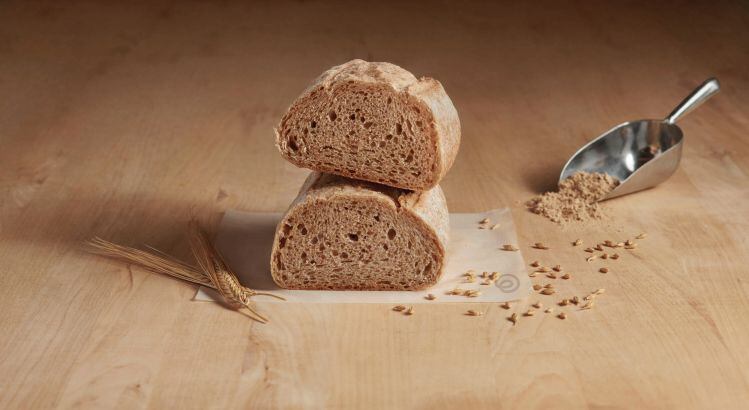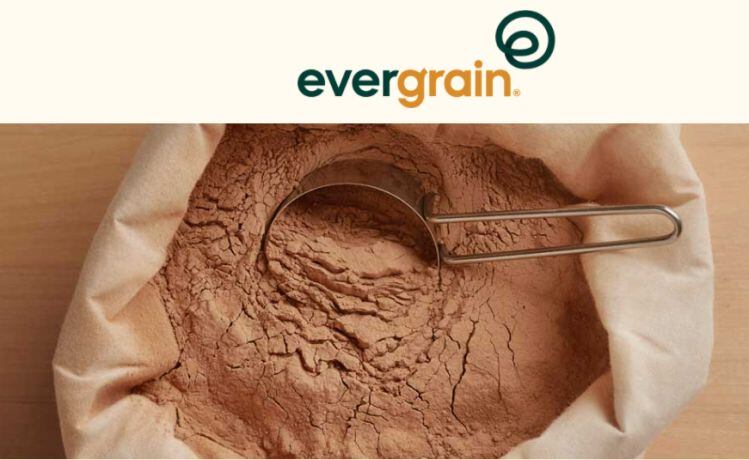Barley is mostly starch (which is why brewers like it, as the sugars in the starch are converted to alcohol in the brewing/fermentation process) and fiber, and only contains around 10-15% protein, so it has not been grown as a protein crop.
‘Spent’ barley (what's left after the brewing process), however, is packed with protein and fiber, but has historically been dumped or used in low-value applications such as animal feed or fertilizer, said EverGrain CEO Greg Belt, who was on assignment in AB InBev’s R&D center in Belgium in 2013 when he first became interested in the fate of the millions of tons of spent grains the brewing industry churns out every year.
“We started working with University College Cork in Ireland and tried to tackle some of the technical challenges, so we looked at a lot of different ideas, and EverGrain was the one that came to the top,” he told FoodNavigator-USA.
“We estimate that the brewing industry produces around nine million metric tons of spent grain and AB InBev generates about 1.4M tons [a year], and today it’s largely sold as animal feed, or fertilizer, or for bioenergy, but it’s food, we should be capturing it as a great source of nutrition.”
Highly soluble protein
EverGrain – which has been developing products from spent grain for a number of years – emerged from stealth mode last fall after signing a deal with Univar to distribute the ingredients, which tap into the upcycling trend and the growing interest in plant-based proteins and sustainability.
While there are now several emerging brands (notably ReGrained) using spent grains in CPG products, EverGrain – backed by one of the world’s largest brewers – can produce ingredients at scale and is working with food & beverage industry partners all over the world to take barley protein into the mainstream, said Belt.
EverGrain has two key product lines: EverPro proteins (EverPro BR with 85% protein from barley and rice, EverPro BC with 80% protein from barley and corn, and a 100% barley product); and EverVita (EverVita Fibra with 60% fiber and 20% protein, and EverVita Pro with 35% protein and 40% fiber).

Brewer’s spent grain is a sticky, wet substance packed with fiber and protein that can “present microbiological challenges” unless you immediately process it into something, says EverGrain CEO Greg Belt.
“We basically gently heat it [to dry it] and mill it in the right fashion, but it took a lot of work to get it right.”
‘It’s very different to other plant proteins’
EverPro isolates are particularly attractive to formulators because the protein is 95% soluble and “neutral-tasting with a slight malty note,” without the off-notes that characterize some plant-based proteins such as pea and soy, said Belt.
“It’s very different to other plant proteins. It’s 95% soluble, so if you dropped 10-20g of it into a glass of iced tea, it’s basically invisible and from a taste perspective, you might taste a very slight malty background note.”
As a result, you can get a meaningful amount of protein into a beverage without encountering formulation challenges, said Belt, noting for example, that you can make plant-based milks with barley that can match the protein levels in dairy. It also works well in protein bars and snacks.
Take Two Barley Milk, which features a EverPro BR barley and rice protein and launched in March 2020, is already on the market in selected stores on the west coast, he said. (This is a pivot from Canvas, a beverage launched in-house by AB InBev in 2017.)

100+ projects underway
EverVita ingredients meanwhile, are attracting a lot of interest in baked goods, pasta, and snacks, said Belt, who said we can expect to see a wave of launches featuring EverPro and EverVita in North America and Europe in the first quarter of 2021.
“You can include it in bread at inclusion levels of 10-20% to make a high protein and high fiber bread that largely doesn’t exist today, or when it does, it doesn’t taste that good.”
As EverGrain has been commercially operating under NDAs with customers for a couple of years, there are now well over 100 projects in progress, he said: "And we’ve accelerated that significantly in the last six months with our Univar agreement and a committed push as we finalized both products.
"As you might expect, the smaller and mid-sized companies are moving faster. They formulate and place into the market more quickly. Some large CPGs have a 'copy' strategy and do not pursue innovation as quickly, but we have been pleasantly surprised how many large CPGs are progressing.
"Nestlé Garden of Life and Puratos are examples of the aggressive top-tier that do not follow. I think we will see many high-profile launches in Europe and USA in the second half of 2021."
Plant-based meat?
As for plant-based meat, he said, “We’re working on it, but it will be a slightly different product than EverPro, as EverPro’s solubility does not help when you get into a meat alternative applications, but when you look at barley, it has all the right characteristics, so it’s coming in our R&D pipeline; you can texturize it.”
Nutrition and consumer appeal
As for nutrition, barley is not a complete protein, but has a respectable PDCAAS score of 0.7, and can be combined with other proteins such as pea if formulators are looking to balance out its amino acid profile, he said.
When it comes to consumer acceptance, barley is something consumers feel good about on a food label, although barley protein, per se, is not an established ingredient, he said. EverGrain has put together a GRAS determination for submission to the FDA to secure the coveted ‘no objections’ letter, he added.
EverGrain applications include:
Bread: Increases specific volume and moistens crumb compared to wholemeal flour; promotes superior machinability and consistency of dough; lowers net carbohydrates and predicted GI
Cakes and muffins: Higher specific volume than cakes fortified with wheat bran or wholemeal flour; water-binding properties to retain moisture during baking; lower in carbs.
Cookies and biscuits: Provides a golden-brown color, promotes crispiness and crunchiness with a light texture.
Pizza crust: Improves on the whole-wheat pizza experience with strengthened mouthfeel; easy to integrate into formulations; delivers a golden-brown crust.
Pasta and noodles: Promotes al dente texture with tensile strength and firmness performance; has ideal extrusion with no sticking together while drying or cooking; claims to deliver more appetizing flavor than legume-based varieties.
Bars and snacks: Has a clean taste with desired texture and chew and minimal moisture transfer; promotes a crisp and crunchy texture for extruded snacks, while enabling higher protein and fiber-fortified positioning.
Shakes and smoothies: Improves mouthfeel of ready to mix protein powder with no chalkiness; offers high dispersibility for easier integration; extends shelf-life with no need for thickeners.
Plant-based milks: Enables clean ingredient legends with impressive dispersibility; simple to blend with other plant-based proteins; enables a creamy, desirable texture that is comparable to dairy milk.
Coffee and tea: Lowers viscosity an average of 40% for smoother mouthfeel; enables boosted protein content without relying on dairy; complementary brown color matches popular coffees and teas.
As a ‘circular’ project using byproducts of the brewing industry, “there’s no additional land or energy needed to grow EverGrain, and minimal water and energy are required to transform this nutritionally dense barley source into an exciting new plant protein,” said Jeffrey Brams, VP R&D at Nestlé-backed supplement maker Garden of Life, which is launching a new range of products using EverPro barley protein in late spring.
Baking ingredient specialist Puratos is also developing products featuring EverGrain “that will allow bakeries to make great tasting, nutritious and sustainable breads featuring barley ingredients in line with consumer preferred texture and freshness expectations,” said group products director Frederik Lievens.

